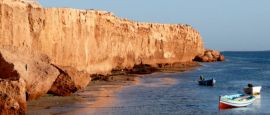Tunisia Shopping and nightlife
Shopping in Tunisia
The medinas of Tunisia's larger towns, such as Tunis, Kairouan, Sousse and Sfax are great places to buy Tunisian crafts, with an amazing range, but you will have to haggle. Souvenir shops in resort areas are plentiful, but you may have to look a bit harder to find high-quality goods.
In terms of what to buy, special purchases include copper and brassware, olivewood sculptures, leather goods such as slippers and bags, clothing (kaftans, jelabas), perfume oils, pottery and ceramics, silver and enamelled jewellery and shishas (water pipes). Sidi Bou Said is famous for its decorative wooden bird cages. Nabeul is a pottery production centre with plenty of independent workshops selling tile work as well as other ceramic art.
Rugs and carpets are a good buy. Kairouan is Tunisia's carpet capital and there are plenty of carpet dealers in town with sumptuous local carpets on display. Many carpet dealers are knowledgeable experts on the carpet craft and can be of excellent help when choosing a carpet. Unfortunately though, there are also a few willing to lie and cheat, so do be aware of this when shopping for a carpet.
Tunisian carpets are, in general, boldly geometric in design and more muted in colour than their Central Asian counterparts. The two major types are woven (non-pile) and knotted (pile). Look out for traditional Berber pieces, called alloucha. The quality of all carpets is strictly controlled by the National Handicrafts Office, and a label attached to the carpet shows its quality seal and grading. The best advice is to only buy the carpet you love, and to never buy straight off the pile. If you spot a carpet you think you might like as it's thrown down, have the carpet dealer remove it from the pile so that you can look at it separately.
Nightlife in Tunisia
Local evening entertainment is dominated by cafe culture and even the smallest town will have one or two cafes where people congregate once the sun has set. The most atmospheric of these are the tiny places which spill out onto the pavement, with customers sucking on shisha pipes, playing backgammon, and drinking tea or coffee into the wee hours.
In bigger cities such as Tunis, Sfax and Sousse, these more traditional places are usually found in or around the medina. The new parts of town usually sport modern adaptations of the cafe which have a more European feel and sometimes serve alcohol. Spending an evening in a traditional cafe can be a great way of getting under the skin of local life.
Cinema is also extremely popular among Tunisians. Films are generally in Arabic or French, and the same is true of the plays at Tunis’s several theatres. Tourist entertainment usually comes in the form of restaurants or hotel bars featuring live music and belly dancers in the evenings from May to September.
In areas that draw a lot of international visitors there are nightclubs, which tend to be either a magnet for wealthy young Tunisians or aimed solely at tourists. Summer is the season for arts festivals, when traditional and international artists arrive in Tabarka, Carthage, Hammamet and Nabeul. In late summer there are also several music festivals.




 You know where
You know where